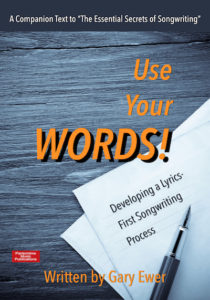The best lyrics, whether they’re straight-forward (“Somebody That I Used to Know” (Gotye), for example), or complex (“Roundabout” – Jon Anderson/Steve Howe), share an important feature: they typically use words that you’d find in casual conversation.
Take some time to look at the lyric sheets of your favourite songs, and no matter what genre you choose, you’ll find that the words and phrases are most likely to be informal, and definitely conversational in nature.
 There’s more to a song hook than meets the ear… a lot more. “Hooks and Riffs: How They Grab Attention, Make Songs Memorable, and Build Your Fan Base” is a vital manual for any serious songwriter.
There’s more to a song hook than meets the ear… a lot more. “Hooks and Riffs: How They Grab Attention, Make Songs Memorable, and Build Your Fan Base” is a vital manual for any serious songwriter.
Part of the unforced characteristic of good song lyrics is that the rhythm and pulse of the music supports and imitates the rhythm and pulse of the words.
If you find that your own lyrics sound forced or awkward, it’s almost always going to be one or both of the following:
- you’re not using words that would usually come up in a friendly and relaxed conversation, and/or
- the rhythm of the music is at odds with the rhythm of the words.
The solution to the first problem is a relatively simple one: find the line in your lyric that sounds stiff or strange, and come up with as many rewordings of that line as you possibly can. You’ll eventually come up with a line that fits — that sounds relaxed and conversational.
The solution to the second problem starts by:
- identifying the line that sounds awkward.
- saying that line over and over, exaggerating the natural up-and-down of your voice. You do this because sometimes not only is the rhythm fighting against the rhythm of the melody, it might be fighting against the actual shape of the melody. Allowing your voice to move up and down will help you find a good melodic contour.
- saying the line over and over and concentrate on the rhythm of the words. Every word has a natural pulse and accent (or series of accents.) The rhythmic way that you say the words needs to be largely reflected in the rhythm of the melody. If the music requires you to place accents in awkward places, that line of lyric will sound awkward to the listener.
Even songs that you think you’ve finished can often benefit from this kind of line-by-line scrutiny, to make sure that you’ve got a lyric that sounds effortless and natural. And it’s definitely worth the time to get it right.
 Written by Gary Ewer. Follow Gary on Twitter.
Written by Gary Ewer. Follow Gary on Twitter.
 “The Essential Secrets of Songwriting” eBook bundle comes with a free copy of “Use Your Words! Developing a Lyrics-First Songwriting Process,” along with a Study Guide. Learn how to make the writing of a good lyric the starting point for your own songwriting method.
“The Essential Secrets of Songwriting” eBook bundle comes with a free copy of “Use Your Words! Developing a Lyrics-First Songwriting Process,” along with a Study Guide. Learn how to make the writing of a good lyric the starting point for your own songwriting method.










